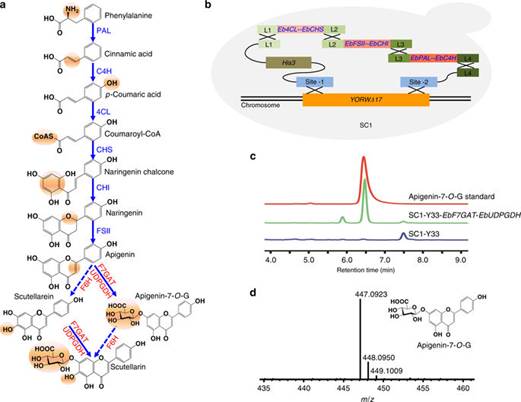天津工生所植物天然产物合成生物学研究取得进展
来源:《自然》
作者:Xiaonan Liu等
时间:2018-04-08

合成生物学以工程化设计理念,对生物体进行有目标的设计与改造,形成生物技术颠覆式创新,有望为破解人类面临的资源、环境等领域重大挑战提供新的解决方案。植物天然产物合成是合成生物学的重点研究方向。1月31日,中国科学院天津工业生物技术研究所与云南农业大学合作,首次实现治疗心脑血管疾病的中成药灯盏花素全合成的最新研究成果,以 Engineering yeast for the production of breviscapine by genomic analysis and synthetic biology approaches 为题,在线发表在 Nature Communications 上。
灯盏花在云南地区民间被用于治疗瘫痪已有上千年历史。灯盏花素具有扩张脑血管的作用,可用于治疗缺血性脑血管疾病,如脑血栓以及由脑栓塞、脑溢血等所致后遗症瘫痪病人。由于临床应用效果显著,1995年灯盏花素制剂被列为全国中医医院急诊科治疗心脑血管疾病的必备中成药。2005年,纯度更、高安全性更好的灯盏花素注射液获得国家药监局审批。目前,该类药品市场价值已接近50 亿元。
天津工生所研究员江会锋带领的新酶设计与酵母基因组工程研究团队、云南农业大学西南中药材种质创新与利用国家地方联合工程研究中心,与云南省药用植物生物学重点实验室主任杨生超团队合作,利用合成生物学和生物信息学技术,从灯盏花基因组中筛选到灯盏花素合成途径中的关键基因(P450酶 EbF6H和糖基转移酶EbF7GAT),并在酿酒酵母底盘中构建灯盏花素合成的细胞工厂。通过代谢工程改造与发酵工艺优化,灯盏花素含量达到百毫克级,具有较高产业化价值。天津工生所、云南农业大学和昆明龙津药业股份有限公司已就灯盏花素规模化生产和药物转化研究,达成产、学、研一体化合作意向,将共同推进微生物合成灯盏花素的产业转化。
心脑血管疾病已成为人类生命健康的最大威胁,其发病率和死亡率已超过癌症而跃居世界第一。中国老年人心脑血管病发病率高达30%,随着我国社会人口老龄化日趋严重,心脑血管类药品的需求正在迅速增加。该项技术成果将有可能将传统农业种植生产方式转变为规模化工业发酵生产路线,可大幅降低灯盏花素的生产成本,推广后可惠及数亿心脑血管病人。(来源:中国科学院天津工业生物技术研究所)
Engineering yeast for the production of breviscapine by genomic analysis and synthetic biology approaches
Abstract The flavonoid extract from Erigeron breviscapus, breviscapine, has increasingly been used to treat cardio- and cerebrovascular diseases in China for more than 30 years, and plant supply of E. breviscapus is becoming insufficient to satisfy the growing market demand. Here we report an alternative strategy for the supply of breviscapine by building a yeast cell factory using synthetic biology. We identify two key enzymes in the biosynthetic pathway (flavonoid-7-O-glucuronosyltransferase and flavone-6-hydroxylase) from E. breviscapus genome and engineer yeast to produce breviscapine from glucose. After metabolic engineering and optimization of fed-batch fermentation, scutellarin and apigenin-7-O-glucuronide, two major active ingredients of breviscapine, reach to 108 and 185 mg l–1, respectively. Our study not only introduces an alternative source of these valuable compounds, but also provides an example of integrating genomics and synthetic biology knowledge for metabolic engineering of natural compounds.
原文链接:https://www.nature.com/articles/s41467-018-02883-z.pdf




